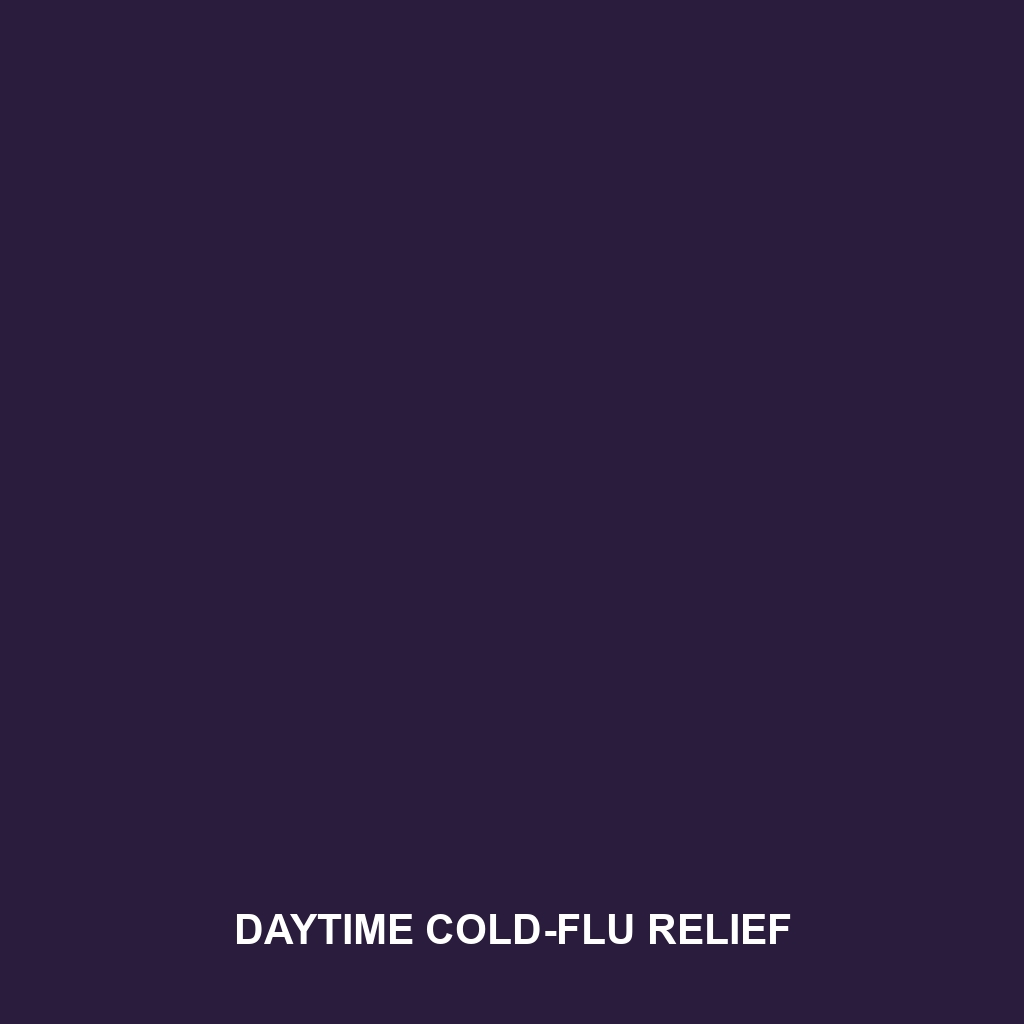Daytime Cold & Cough:
Definition and Description of Daytime Cold & Cough:
Daytime cold and cough refers to the respiratory symptoms commonly experienced during the day, particularly characterized by a runny or stuffy nose, sore throat, and persistent cough. Medical professionals often categorize colds as upper respiratory infections, usually caused by viral pathogens, leading to inflammation and irritation in the throat and nasal passages. Daytime occurrences are especially troublesome as they can interfere with daily activities, work productivity, and overall quality of life.
Causes of Daytime Cold & Cough:
The primary causes of daytime cold and cough include viral infections such as rhinovirus, which is responsible for the majority of cold cases. Other external factors include exposure to allergens like pollen or dust, changes in weather, or irritants such as smoke and strong odors. Additionally, underlying health conditions like asthma or chronic sinusitis can exacerbate symptoms. Genetic predispositions might also play a role in an individual’s susceptibility to these ailments.
Associated Symptoms of Daytime Cold & Cough:
Common symptoms associated with daytime cold and cough include:
- Runny or congested nose
- Sore throat
- Frequent sneezing
- Fatigue
- Watery eyes
- Body aches
- Low-grade fever
Diagnosis of Daytime Cold & Cough:
Healthcare professionals typically rely on patient history and physical examinations to diagnose daytime cold and cough. They may inspect the throat, ears, and nasal passages for signs of inflammation. In some cases, rapid tests for viruses or throat cultures may be conducted to rule out strep throat or other infections, though these are less common for a typical viral cold.
Risk Factors for Daytime Cold & Cough:
Individuals at higher risk for developing daytime cold and cough include children, the elderly, and those with weakened immune systems. Lifestyle factors such as smoking, poor nutrition, and lack of sleep also contribute to vulnerability. Environments with high crowding, like schools and public transport, may increase exposure to viruses that cause colds.
Complications of Daytime Cold & Cough:
If left untreated, daytime cold and cough can lead to complications, especially in vulnerable populations. Potential complications may include sinus infections, ear infections, or exacerbation of chronic diseases like asthma or chronic obstructive pulmonary disease (COPD). Additionally, prolonged coughing could result in rib fractures or injuries.
Treatment Options for Daytime Cold & Cough:
Treatment options for daytime cold and cough are generally aimed at symptom relief. Over-the-counter medications like decongestants, antihistamines, and cough suppressants can be effective. Home remedies such as warm saltwater gargles, steam inhalation, and staying hydrated with adequate fluids are also beneficial. Rest and proper nutrition play crucial roles in recovery.
When to See a Doctor for Daytime Cold & Cough:
It’s advisable to consult a healthcare professional if symptoms persist longer than 10 days, worsen significantly, or are accompanied by high fever, difficulty breathing, or wheezing. Early medical intervention can prevent further complications.
Prevention of Daytime Cold & Cough:
Preventative measures include practicing good hygiene, such as washing hands frequently, avoiding close contact with infected individuals, and implementing respiratory etiquette (covering mouth and nose when sneezing or coughing). Vaccinations for influenza and pneumococcal disease can also reduce the risk of respiratory infections.
Statistics and Prevalence of Daytime Cold & Cough:
According to the Centers for Disease Control and Prevention (CDC), the average adult experiences 2-4 colds per year, while children may experience 6-8. Seasonal variations report the highest incidence during the fall and winter months, coinciding with increased indoor activities.
Personal Stories or Case Studies about Daytime Cold & Cough:
Many individuals share experiences of how daytime cold and cough have impacted their lives, particularly through interruptions in their work or school. A case study highlighted a student who fell behind in classes due to recurrent colds, illustrating the profound effects on daily functioning. Expert opinions suggest that promoting awareness about prevention and early treatment can mitigate these occurrences.
Myths and Misconceptions about Daytime Cold & Cough:
One common misconception is that cold weather itself causes colds; however, it’s the increased indoor crowding during colder months that facilitates the spread of viruses. Another myth is that antibiotics can treat viral colds, while they are only effective against bacterial infections.
Support and Resources for Daytime Cold & Cough:
For those dealing with daytime cold and cough, numerous resources are available to provide guidance and support. Consider visiting this support page for additional resources and help.
Conclusion about Daytime Cold & Cough:
In summary, daytime cold and cough are common ailments that can significantly disrupt daily life. Understanding their causes, symptoms, and treatment options can empower individuals to take proactive measures. Keeping informed on prevention strategies and knowing when to seek medical advice are crucial steps in managing these conditions effectively.
